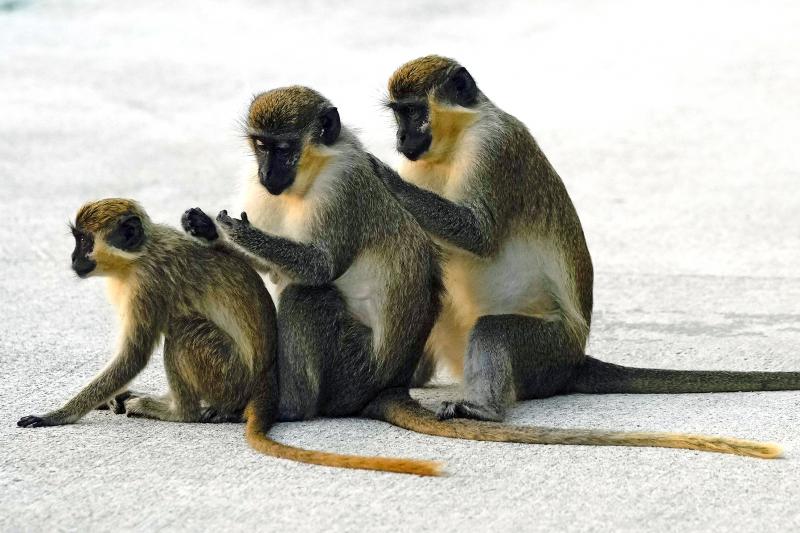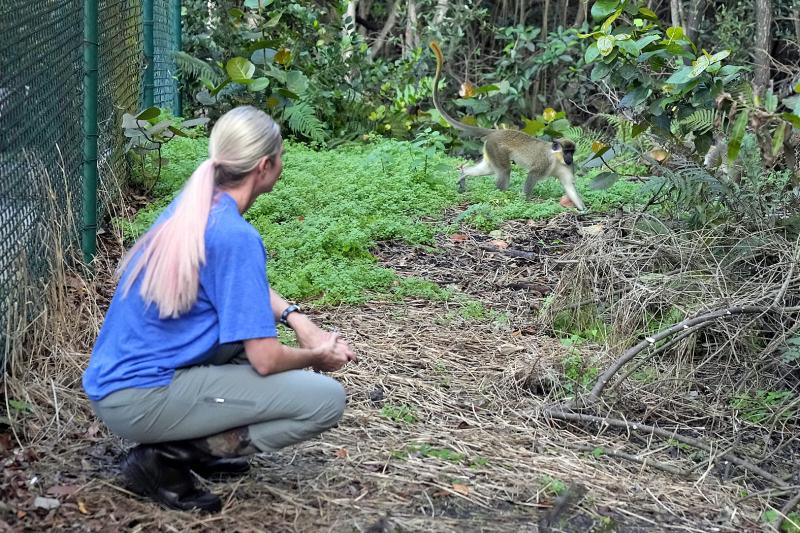As departing jetliners roared overhead, an aging vervet monkey moped on a mangrove branch one recent afternoon in the woods he inhabits near a South Florida airport, his ego bruised.
Mikey, as he is called by his human observers, has long been the laid-back alpha male of a troop of monkeys ruling this tract of land, tucked off a busy runway at Fort Lauderdale-Hollywood International Airport. But this day he lost when challenged by a feisty youngster called Spike. Mikey fled screaming and was now sullenly staring at humans watching him from 4 meters away.
“Did you have a bad day?” asks Deborah “Missy” Williams, a Lynn University science professor who has been studying the troop and others nearby since 2014. She is also founder of the Dania Beach Vervet Project, which seeks to preserve this unique colony. “We will leave you alone so you can ponder.”

Photo: AP
The US has no native monkeys, but the smallish vervets have roamed Dania Beach since the late 1940s after a dozen brought from West Africa fled a now long-closed breeding facility and roadside zoo. Today, 40 descendants are broken into four troops living within 1,500 acres around the airport. Florida also has a few colonies of escaped macaques and squirrel monkeys.
Florida wildlife officials often kill invasive species to protect native animals. But they tolerate the vervets, if they stay put. The monkeys are local celebrities, their travails detailed by TV and newspapers, and popular visitors with nearby workers, who feed them despite signs saying that’s illegal.
“My friends are like, ‘You have monkeys at your job?’” laughed airport parking lot attendant Harlen Caldera as she gave them raisins and nuts. Some ate from her hand, while others snatched what food she scattered.

Photo: AP
Travelers are often surprised to see the monkeys. They squeal in delight and grab their cellphones, hoping for photos. Vervets are gray and black with a greenish tinge, helping them blend into the trees. Males typically grow to 0.6 meters and 6.8 kilograms; females reach 0.5 meters and 4.5 kilograms. They live about 20 years.
Caldera and her coworkers are protective of the monkeys, which have no fear of humans, making sure no one tries to catch or harm them.
“You never know what people will do,” she said.
The entrance to the 16 acres ruled by Mikey, the matriarch, Snow White, and their troop is at the parking lot’s rear, sealed by a locked fence. The mangrove trees are thick and the trail muddy — except where it’s covered in shallow water.
Williams began studying monkeys while doing doctoral work at Florida Atlantic University, and stayed on. As she and her guests waded deeper into the monkeys’ grounds one recent afternoon, the 16-member troop approached. The colony lives on spiders, ants, lizards, seeds and flowers — when not scrounging people food.
“They quickly learn to adapt to a human diet — they love sugary things and salty things,” Williams said, noting they tolerate human food remarkably well.
In Africa, vervets are eaten by leopards, eagles and snakes. But in Florida the dangers are outside the mangroves — mostly cars and trappers, who sell them as pets.
Because of their small population, Williams is concerned inbreeding will harm the monkeys’ health. In Africa, vervet males leave their birth troop when they reach sexual maturity at 5 years and join another. They move again every few years. With only four local troops, there isn’t enough rotation among the males, making the genetic pool small.
As monkeys are an invasive species, Florida puts tight restrictions on how Williams’ group can help them. Trapped monkeys can’t be released — they must be euthanized or placed into captivity.
As Williams doesn’t believe monkeys should be pets, she doesn’t seek veterinary care for seriously injured and ill monkeys, hoping nature will heal them. But her group is building an enclosure for vervets captured for treatment or because they wandered too far.
Ultimately, Williams wants Florida to allow the release of captured vervets. Unlike Burmese pythons, iguanas and other invasive species, she argues, the colony doesn’t harm the environment.
“The monkeys’ lives matter regardless if they are nonnative or native,” she said. “All options should be exhausted to avoid euthanasia.” Her models show that without change, the colony will die off within 50 years.
The Florida Fish and Wildlife Conservation Commission responded that while the colony can remain, no exception allowing the monkeys’ release after capture can be made because their effects on the ecosystem are “not well understood.”
“There is also an inherent risk of injury when handling wildlife. Monkeys can act defensively and may bite or scratch. Mammals, including vervet monkeys, may harbor diseases transmissible to humans including rabies,” the statement said.
As darkness neared, the troop moved from the mangroves into the airport parking lot. It’s dinner time and there are seeds to pluck and workers’ treats to get. Some played while others groomed each other. Spike and Mikey again tussled before Williams’ admonition separated them. The aging king and his would-be heir then sat feet apart, eyeing each other warily.
Soon sated, the monkeys climbed back into their trees to spend another night in their unexpected realm, paying no heed to the loud metallic birds flying above.

Even by the standards of Ukraine’s International Legion, which comprises volunteers from over 55 countries, Han has an unusual backstory. Born in Taichung, he grew up in Costa Rica — then one of Taiwan’s diplomatic allies — where a relative worked for the embassy. After attending an American international high school in San Jose, Costa Rica’s capital, Han — who prefers to use only his given name for OPSEC (operations security) reasons — moved to the US in his teens. He attended Penn State University before returning to Taiwan to work in the semiconductor industry in Kaohsiung, where he

On May 2, Chinese Nationalist Party (KMT) Chairman Eric Chu (朱立倫), at a meeting in support of Taipei city councilors at party headquarters, compared President William Lai (賴清德) to Hitler. Chu claimed that unlike any other democracy worldwide in history, no other leader was rooting out opposing parties like Lai and the Democratic Progressive Party (DPP). That his statements are wildly inaccurate was not the point. It was a rallying cry, not a history lesson. This was intentional to provoke the international diplomatic community into a response, which was promptly provided. Both the German and Israeli offices issued statements on Facebook

May 18 to May 24 Pastor Yang Hsu’s (楊煦) congregation was shocked upon seeing the land he chose to build his orphanage. It was surrounded by mountains on three sides, and the only way to access it was to cross a river by foot. The soil was poor due to runoff, and large rocks strewn across the plot prevented much from growing. In addition, there was no running water or electricity. But it was all Yang could afford. He and his Indigenous Atayal wife Lin Feng-ying (林鳳英) had already been caring for 24 orphans in their home, and they were in

Australia’s ABC last week published a piece on the recall campaign. The article emphasized the divisions in Taiwanese society and blamed the recall for worsening them. It quotes a supporter of the Taiwan People’s Party (TPP) as saying “I’m 43 years old, born and raised here, and I’ve never seen the country this divided in my entire life.” Apparently, as an adult, she slept through the post-election violence in 2000 and 2004 by the Chinese Nationalist Party (KMT), the veiled coup threats by the military when Chen Shui-bian (陳水扁) became president, the 2006 Red Shirt protests against him ginned up by